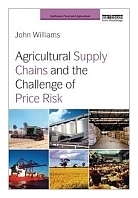|
||
• wydawnictwa polskie
• Zamów informacje o nowościach z wybranego tematu • kontakt
• Cookies na stronie |
AGRICULTURAL SUPPLY CHAIN AND THE CHELLENGE OF PRICE RISKWILLIAMS J.wydawnictwo: ROUTLEGDE , rok wydania 2013, wydanie Icena netto: Agricultural Supply Chains and the Challenge of Price RiskThis book discusses the issues of integration within food and fibre supply chains and the challenges in managing price risk. The problems of integration and price risk are interwoven in agricultural supply chains with production and supply risk as well as hoarding. However, without supply chain integration through commercial trade markets there can be no forward market upon which forward transactions and the management of price risk can be based. Without a forward market that can reduce opportunistic behaviour, there is likely to be little security of supply, particularly under high production risk and price uncertainty. Whilst price risk management is possible under certain circumstances, there are many factors that can prevent the development of forward markets or cause them to collapse, thus undermining the ability to manage price risk within acceptable risk and return parameters. Market positions therefore need to be valued and often settled daily due to the risk of contract default. In addition, the issue of currency risk and its management applies to international market positions and transactional exposures. The book analyses a range of price risk management strategies from forward contracting through to futures and options hedging, and finally to over-the-counter products. Evaluation techniques are developed to aid decision-making. The author concludes that forward market development may be the exception rather than the norm, and that whilst favourable price risk management outcomes may be possible, they can sometimes be caused more by luck than through good management. It is shown how tactics are an important consideration in decision-making to minimize costs and losses. "John Williams work is a pioneering contribution to explain the complex use of financial agricultural markets for participants of the physical markets. It presents the opportunities and the strategies of using derivative contracts, from basic forward contracts to structured derivatives, in a very sound manner. The implications for the efficiency of supply chains are clearly stated. A challenging work which is really a great success." - Jean E. Cordier, Professeur Agrocampus Ouest, France. "Risk in the production and distribution of agricultural commodities is influenced by production uncertainty, price risk, and the institutional environment in which trading occurs. The major actor in this environment is government, which can both facilitate the management of risk management institutions such as derivatives markets and also limit their efficient operation through subsidies, production-price controls, over-regulation, etc. This book focuses on the important issues affecting markets, as well as explaining the principles and mechanics of risk management strategies." - Professor Bill Schroder, Melbourne, Australia. "John Williams brings to us in this new book an interesting and integrated approach to the growing uncertainties existing in modern food chains. The challenge to produce food for a growing population, with income changes and urbanizing, is putting pressure on resources, increasing our exposure. It is a very important topic for discussions in the next decade, and the book helps to improve our capacity of analysis." - Professor Marcos Fava Neves, University of Sao Paulo, Brazil. Introduction 1. Integration and Forward Contracting 2. Forward Markets 3. Problems with Risk Management 4. Position, Default, and Valuation 5. Futures Hedging and Basis Risk 6. Options Hedging and Price Enhancement 7. OTC Pricing Products 8. Tactics and Evaluation 9. Post-harvest Issues 10. Currency and Risk Management 11. Limitations in Managing Risk 12. Arbitrage and Spread Trades Conclusion 304 pages, Paperback Księgarnia nie działa. Nie odpowiadamy na pytania i nie realizujemy zamówien. Do odwolania !. |


